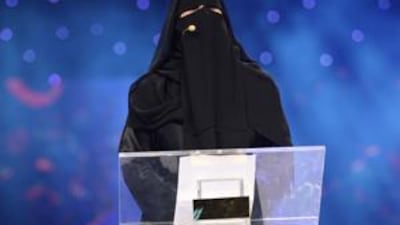ABU DHABI // A housewife who was the subject of death threats after reciting a poem on the Million's Poet television show that attacked "ad hoc fatwas" performed a similar poem this week - and reached the final. Hissa Hilal, a Saudi, said her work was inspired by what she called "subversive" fatwas, specifically one issued by Sheikh Abdul-Rahman al Barrak, a Saudi cleric, on his website last month.
Her recital on the Abu Dhabi TV show last week sparked controversy in Saudi Arabia, especially on internet forums. According to reports, many viewers praised her for her courage, but others attacked her for criticising clerics and reciting her poems in public. One website called for her death. But Ms Hilal defied the threats, delivering a similar poem on Wednesday's show - and she received the highest score of the round, 47 out of 50.
The judges praised Ms Hilal's courage for expressing her opinion "honestly and powerfully". By reaching the final, she is guaranteed a prize of at least Dh1 million (US$270,000). Sheikh al Barrak's fatwa had called for the execution of anyone who says mixing of sexes is allowed in Islam because "he is allowing what is not allowed, and therefore he is a kafir who left the religion and should be killed if he does not change his opinion".
The poem performed by Ms Hilal last week loosely translates as: "I have seen evil from the eyes of the subversive fatwas in a time when what is lawful is confused with what is not lawful; "When I unveil the truth, a monster appears from his hiding place; barbaric in thinking and action, angry and blind; wearing death as a dress and covering it with a belt [referring to suicide bombing]; "He speaks from an official, powerful platform, terrorising people and preying on everyone seeking peace; the voice of courage ran away and the truth is cornered and silent, when self-interest prevented one from speaking the truth."
The Saudi newspaper Al Watan reported that a member of the Ana al Muslim (I am the Muslim) website - which has previously posted videos about al Qa'eda operations - called for Ms Hilal's death. One member was quoted by the newspaper as posting the message: "Can anyone tell me her address?" Sheikh al Barrak told the newspaper that his fatwa had been misinterpreted by his students and was posted on the internet inaccurately.
He said he meant the fatwa only to refer to men and women mixing in private places, alone. Ms Hilal said yesterday: "Like anyone who receives a threat to scare him or her, I take it seriously but only slightly." She said her family had asked her to restrict her poems to "ordinary" issues. But she added: "I want peace for everyone, Muslims and others. We are all living in a global village, so we cannot live without each other."
The fatwas were "subversive thinking, terrifying thinking, and everyone should stand against it. One should not kill or call for the killing of people only because they do not belong to their system of thought or to their religion". A key element of extremism's power was clerics' use of language that was "embedded in the consciousness of ordinary people", Ms Hilal said. She called on moderate scholars of religion to counter that by using the same language.
"This is the danger of terrorist thinking - to use the religious terms and expressions that are deep-rooted in everyone's psyche," Ms Hilal said. "Most contemporary writers and scholars use a modern language to critique such thinking while Arab imagination is caught in a language that was used 14 centuries ago. "People will be more impressed with the one who uses the old language, the language used by pious people in the past."
She said she had first considered writing her poem about two months ago and had in mind fatwas issued to "terrorise people". "When I went to some open GCC countries, I noticed that western people looked at me suspiciously because I was wearing the niqab, but they would not do the same when they see a Sikh wearing the turban," she said. "Who is responsible for this suspicious look? Who made it happen? It was this kind of people - extremists - who have given us a bad name. Muslims, instead of being respected, they are a source of fear and suspicion because of these people."
Al Sayed Ali al Hashimi, an adviser at the Ministry of Presidential Affairs, criticised ad hoc fatwas that did not comply to proper, scholarly Islamic rules. Although the mixing of the sexes, especially physical displays of affection, was not allowed in Islam, that did not "amount to calling them kafirs or killing them", he said. "There are extremist fatwas, and they are rejected, and there are loose fatwas, and they are also rejected," Mr al Hashimi said. "The best way is the middle way.
"The mixing of the two sexes or physical display of affection fall under the principle of ethics. Only rejecting an Islamic pillar such as the daily prayers, the profession of faith, Haj, Zakat and observing Ramadan make one a kafir." Ms Hilal will compete against four others in the final. The winner will get Dh5m; second place will get Dh4m; third place Dh3m; fourth place Dh2m; and fifth place Dh1m.
hassan@thenational.ae

